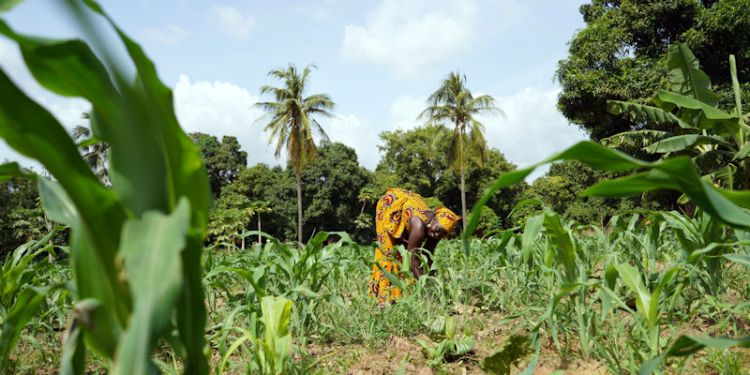Modelling climate impacts to strengthen global food security

Hotter temperatures, regularly occurring as the climate changes, are threatening the survival of staple food crops, such as maize and rice in many tropical countries. Andy Challinor, Professor of Climate Impacts, is combining crop and climate models to paint a global picture of exactly how the climate changes affect crops.
The results, including a new data analytics tool which is the first of its kind, inform policymakers devising strategies to strengthen global food security.
In Africa, it can take up to 10 years to acquire and grow a new crop, but temperatures are rising at a much faster rate. Hotter conditions weaken crop biomass, meaning the nutritious quality of the crops deteriorates as the crop cycle completes.
Decreased food productivity is a major problem in tropical regions dependent on seasonal weather patterns to grow crops. With arid and ‘wet’ seasons growing in length and intensity, rain-fed agricultural systems are exposed to challenges such as soils becoming vulnerable to erosion and perishing crops in hot climates.
Without forward planning, major food crops supply could be at serious risk.
“Already we have seen evidence of extreme droughts and heat waves caused in part by climate change,” said Professor Challinor. “Our global meta-analysis of crop yields highlighted the negative consequences of climate change on food systems. Without forward planning, major food crops supply could be at serious risk.”
Complex crop modelling as a basis for food futures
A complex combination of computer models of datasets ranging from climate, crops and trade data, to food nutritional composition, is being used by Professor Challinor and his team. Combining these models produces a top-level representation of different options for feeding societies under climate change. It shows, among other aspects, the outcomes for these crops in likely climate scenarios, quantifying a range of factors such as greenhouse gas mitigation, water use and soil fertility.
The climate projections build a picture that helps policymakers to respond to the whole host of possible future climates. The new tool is called the integrated Future Estimator for Emissions and Diets (iFEED). It is significant because it represents climate, food, trade and nutrition futures in a way that is more complete and flexible than ever before.
Food security and economic growth in Africa
Through the AFRICAP project, Professor Challinor is leading four country-specific taskforces aiming to mitigate the effects of agricultural practices on the environment. He is developing an interactive tool to represent iFEED outputs online, so that Government Officials can use it to prepare for climate scenarios.
Professor Challinor said: “It is anticipated that our interactive tool, which paints a holistic picture of what the future may look like, will be used by key-decisionmakers to assess the implications of climate change for the food system. It should be used to map realistic routes to achieve critical carbon mitigation targets by 2050.”
Part of the research uses the GLAM model, which he developed in place of existing models that were limited in scope.
It is anticipated that our interactive tool... will be used to map realistic routes to achieve critical carbon mitigation targets by 2050.
Professor Challinor is also working to develop ‘climate-smart’ technologies that adapt to climate change while ensuring that the carbon footprint of agriculture is reduced. The work, conducted through the Climate Change Agriculture and Food Security (CCAFS) project, is enabling farmers to adopt alternative land management strategies. The aim is to mitigate the amount of carbon generated by farming practices and equip the farmers with resilience amid the changing environmental conditions.
“Through CCAFS we have uncovered new knowledge contributing to the reduction of risk in agricultural practices associated with climate change,” said Professor Challinor. “Using the results, we hope to attract further investment so that the farming technologies can be adopted on a wider scale.”
Future planning
For the UK Climate Change Risk Assessment 2022, Professor Challinor is investigating how climate change will affect the UK through impacts that occur abroad, such as trade. He is advising the UK Government on issues addressed at the 2019 United Nations Framework Convention on Climate Change Conference (UNFCCC).
Contact us
If you would like to discuss this area of research in more detail, please contact Professor Andy Challinor.

